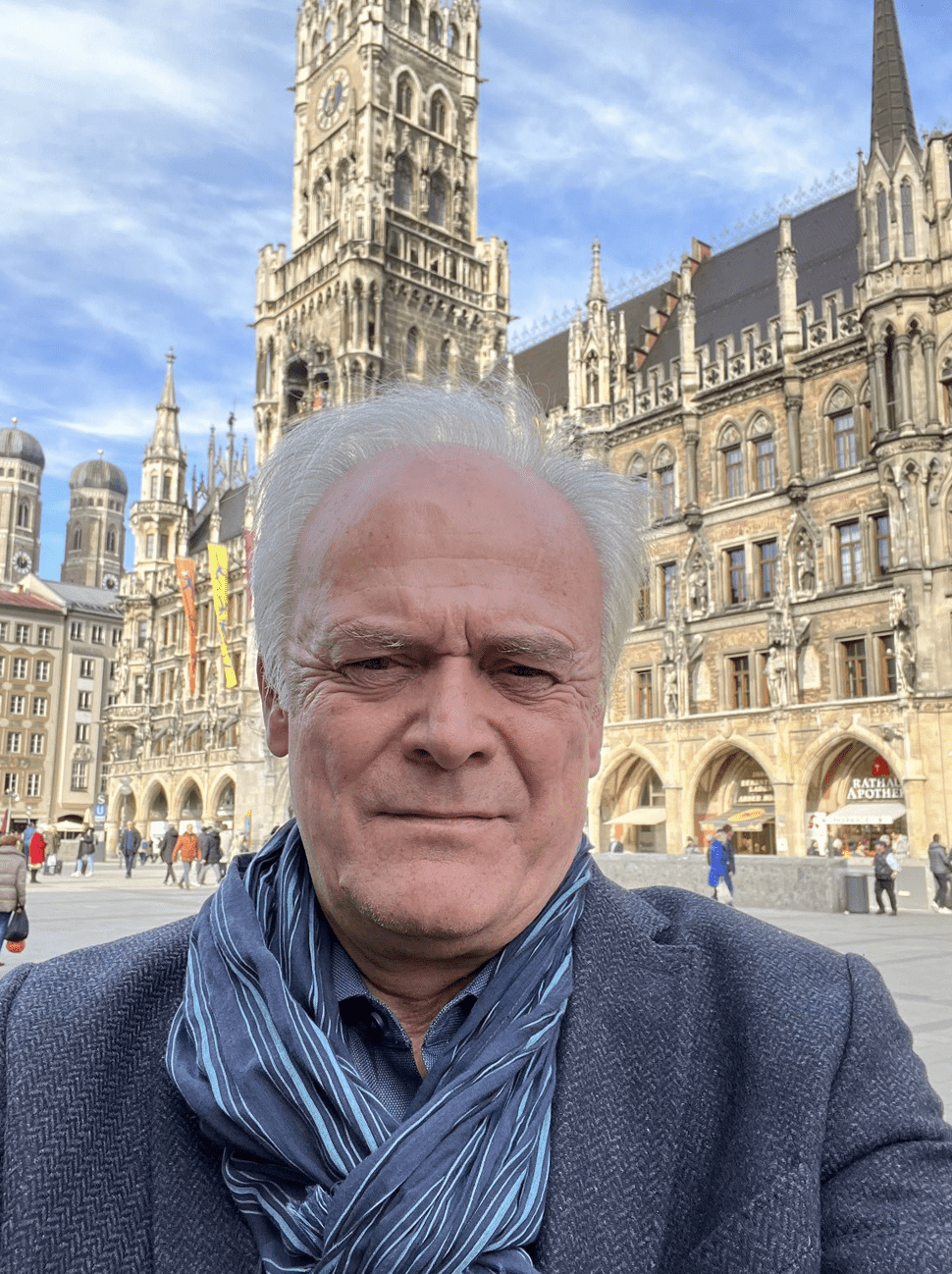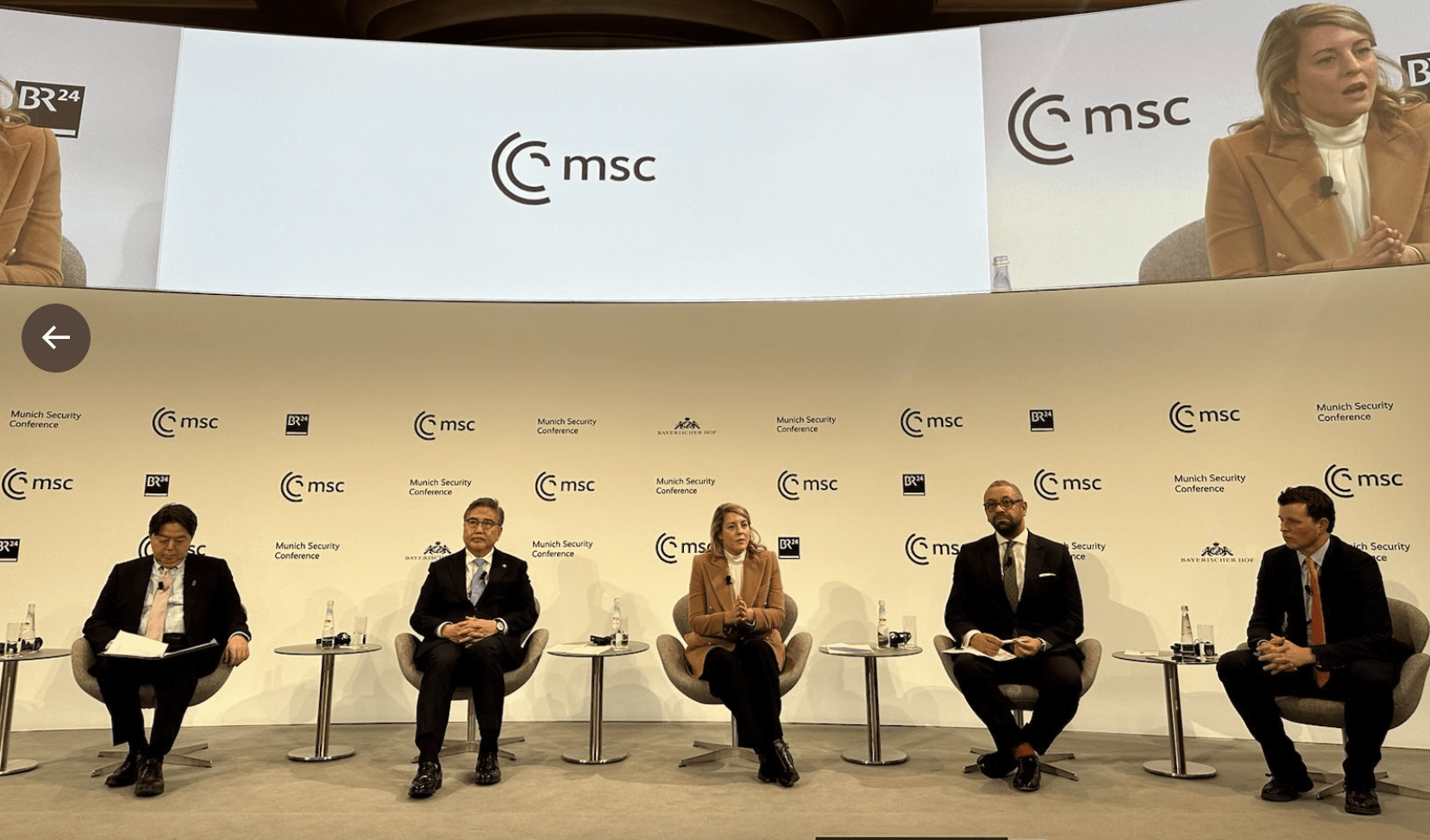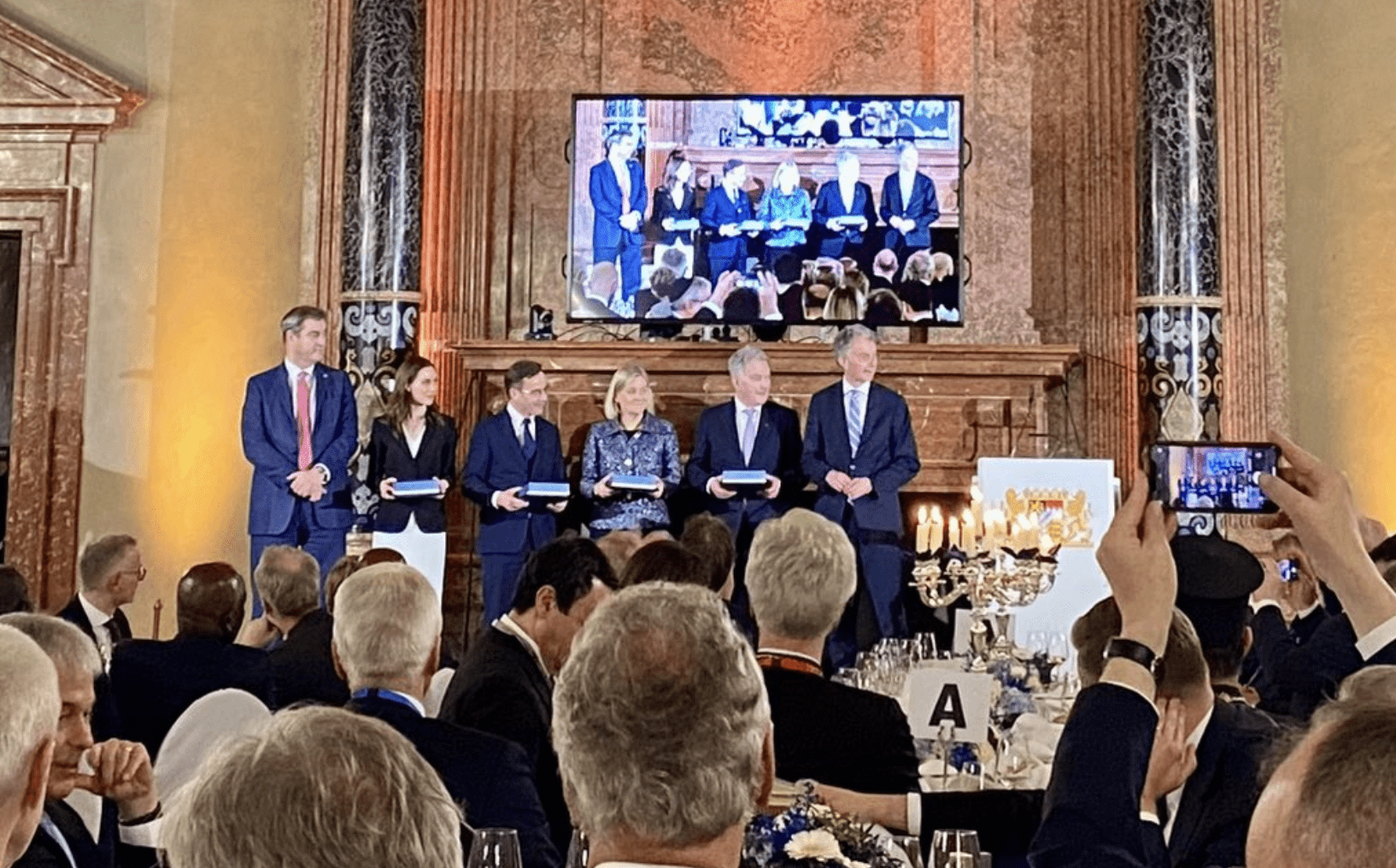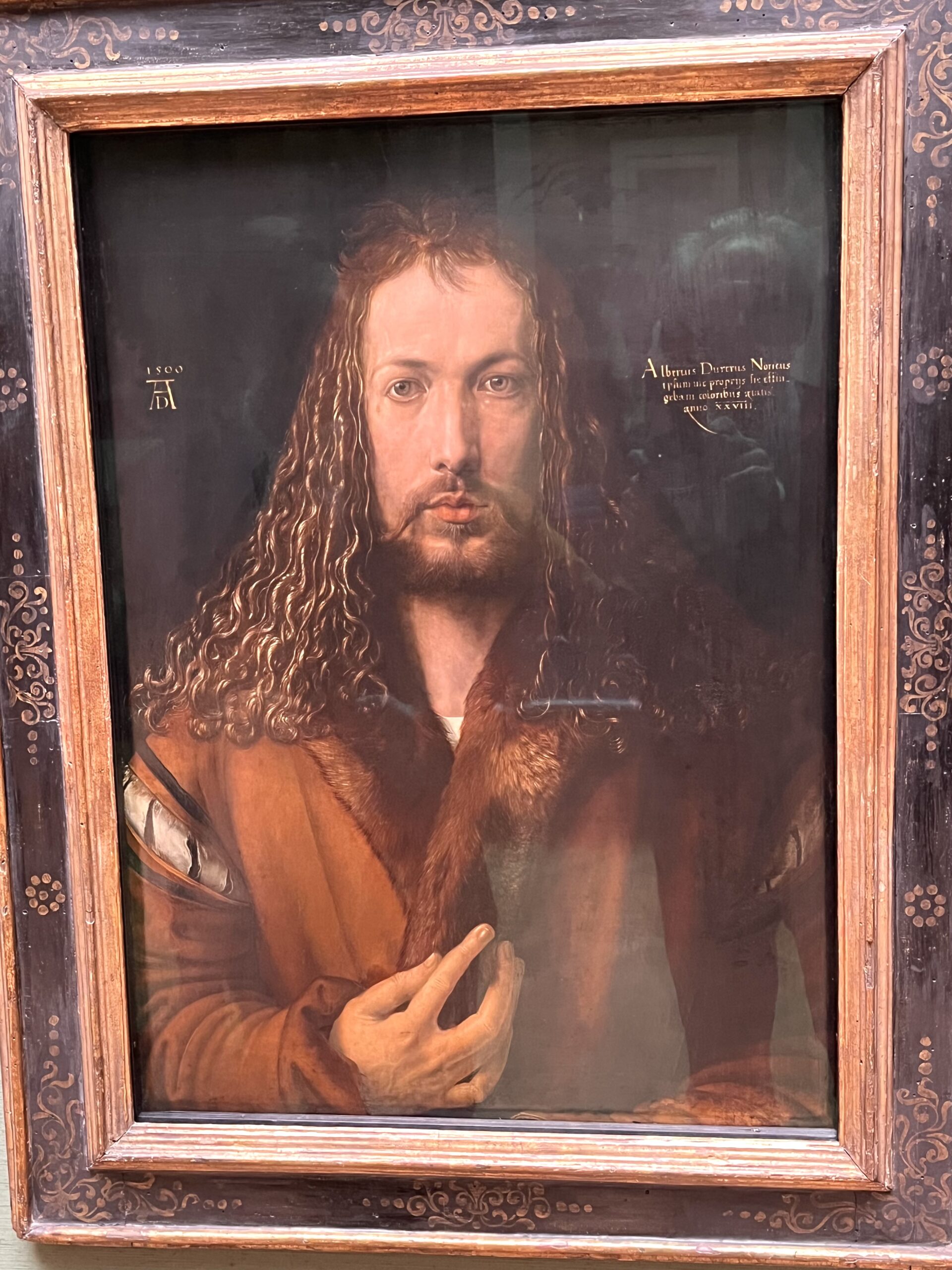Policy Dispatches: From Weltschmerz to Hope on a Return to Munich

Not a member of the Bundestag: A Canadian in Munich/@SenBoehm
Peter M. Boehm
February 20, 2023
I first attended the Munich Security Conference (MSC) in 2009, accompanying our then-minister of National Defence, Peter MacKay, in my role as Canada’s ambassador to Germany. This year, I was invited to participate as a delegate, most likely in recognition of my role chair of Canada’s Standing Senate Committee on Foreign Affairs and International Trade.
This annual event brings together leaders, ministers, policy makers, generals, foreign and defence policy experts from all over the world. It is the largest of its kind; our Halifax International Security Forum, recently profiled in this magazine, is a much more intimate but no less effective affair. Keynote speeches by leaders, panels featuring ministers and think-tank events run in parallel with diplomatic speed-dating, mostly choreographed, but also featuring accidental “bump-intos”, “pull-asides” and “brush-bys” as well as more serious sit-down bilateral meetings.
The Conference is a whirlwind of diplomatic activity, lobbying and often hard-core negotiation. Evolving from its origins in 1963 as a more focused military and security forum, it now addresses thematic issues that span the globe. This year’s discussions were sober: the ongoing war of aggression by Russia in Ukraine, the expansion of NATO with the imminent additions of Finland and Sweden to the organization, ballooning US/China tensions, concerns of the “global south” and “Whither the international rules-based order?”, to name a few of the subjects. Canada was ably represented by foreign minister Mélanie Joly, who participated in an exhausting schedule of meetings, fresh from a visit to Ukraine.
 Foreign Affairs Minister Mélanie Joly on an MSC panel on Indo-Pacific Security. Mélanie Joly/Twitter
Foreign Affairs Minister Mélanie Joly on an MSC panel on Indo-Pacific Security. Mélanie Joly/Twitter
I do not wish to dwell on the excellent speeches of Chancellor Olaf Scholz, President Emmanuel Macron, the début of Prime Minister Rishi Sunak, the strident voice of China’s top diplomat, Wang Yi, or the strong statement on Russian war crimes by Vice President Kamala Harris. I was in the overheated main conference hall for all of them, and they confirmed if not increased my Weltschmerz on the parlous state of our world.
I had first visited Munich as a student, then frequently during my ambassadorial posting in Berlin. A large, fascinating city with a history that is very different from that of Berlin — of course, partition did not affect its postwar redevelopment. Canada has a consulate here, and the Délégation générale du Québec is also located here. Bavaria has bilateral agreements with Québec, Ontario and Alberta. I recall accompanying then- premiers Jean Charest and Ed Stelmach on their successful visits. There is also an annual Canadian studies conference in the alpine village of Grainau, south of here, that brings together Canada-focused academics, artists and students from German-speaking countries and Canada.
On this visit, during MSC2023, Canadians were housed in the small Platzl Hotel in the historic centre, not an officially recognized MSC hotel but economical and about a twenty-minute walk to the venue (yes we do like to save where we can). Mozart had lived around the corner for a while, no doubt getting sustenance from the Hofbräuhaus beer hall next door. On one of my walks, I was stopped by an elderly gentleman who decried the Conference as an English-speaking event and lamented the decline of the German language. I politely disagreed and he suggested that I, as a member of the Bundestag, should speak with the chancellor when I am back in Berlin. I explained that I was a visiting Canadian delegate, and that our conversation in German only proved that there was no linguistic decline.
On my walk the next day, I was engulfed in a “Free Iran” demonstration and had to recalibrate my route, just passing another, larger demonstration of “Querdenker” (contrarians) who had morphed from anti-vaxxers and anti-maskers to “NATO Hands Off Russia” placard-carriers. All under the watchful eyes of many very calm police officers. Demonstrations for this event are nothing new. With the exception of the Americans, who always bring their own vehicles for their leaders, all other motorcades were comprised of electric-powered cars. The same seemed to be increasingly true for regular traffic. When I left here ten years ago, almost everything on the roads, large and small, used diesel fuel.
Munich still shows its history as the capital of the independent kingdom of Bavaria in the 19th century, as well as duchy and Holy Roman Empire origins before that with broad avenues and squares bordered by grand colonnaded buildings. Conference delegates dined in the marbled dining hall of the Residenz, the royal palace that dates back to the fourteenth century. It was here during this conference dinner that the leaders of Finland and Sweden gave eloquent and moving speeches about their decision to have their countries join NATO.
 Finland and Sweden receive the Ewald von Kleist Award for seeking NATO membership. Isabelle Poupart/Twitter
Finland and Sweden receive the Ewald von Kleist Award for seeking NATO membership. Isabelle Poupart/Twitter
Munich suffered heavily under Allied bombing in 1944, with almost 7,000 people killed and half its buildings destroyed or damaged, including the Residenz. Yet everything was rebuilt or replaced, even the bombed-out Bürgerbräukeller where Hitler staged his infamous beer hall “putsch” a century ago. A large cultural centre was built on that site.
Following the conference, I took a long walk from the Karlstor — one of three remaining gothic town gates from Munich’s famed city wall — down the Old Town shopping pedestrian mall that is Neuhauserstrasse. It being Sunday, the shops were closed (this is very Catholic Bavaria after all) but families were out happily walking. I heard Eastern European languages, Arabic, Mandarin. These were newcomers, working towards fitting into German society. I was reminded of the meeting I had the day before with the leader of the federal Green Party who is of Iranian origin; he explained to me that Germany had changed quite a bit since my departure ten years ago. I stopped for a Glühwein (mulled wine) on the street and was served by a couple from Odesa, Ukraine (who, of course, had family in Canada). These being the last few days of Karneval (Munich’s Mardi Gras), I saw a few young people in Karneval livery (tricorner hats, majorette outfits) singing along to excruciating German pop songs. They said they were from Syria and I resisted their invitation to join in.

The ‘greatest self-portrait ever painted’: Albrecht Dürer at the Alte Pinakothek
With all these images in mind, I walked to the crowded Alte Pinakothek art gallery to see what I consider to be the most stunning and brilliant self-portrait by a master of all time: Albrecht Dürer’s painting of himself in 1500 at the age of 28. It is a full frontal view, he is clear-eyed, looking to the future, pointing to his heart, confident in the genius of his art in a Salvador Mundi pose. The New York Times dubbed it “the greatest self-portrait ever painted”. Dürer might not have saved the world, or anticipated the fraught history of what eventually became his country. But for me, his gaze, the memories of my walks in Munich, the people I met, especially outside the conference, were all restorative. Hope can crush Weltschmerz.
Senator Peter M. Boehm, chair of the Senate Standing Committee on Foreign Affairs and International Trade, is a former ambassador to Germany and deputy minister who served as Canada’s sherpa for six G7 meetings.
